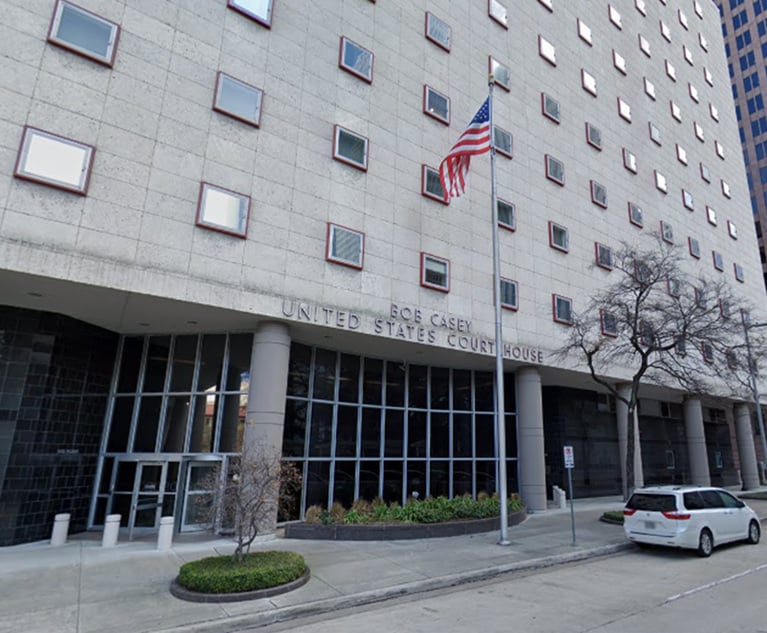Why Even Uncertain Economic Times Call For Legal Tech Investments
AI and tech stacks investments are key to easing data movement and contact between parties regardless of the current economic situation.
February 22, 2023 at 06:48 PM
4 minute read
Legal Services
By 2025, 97 percent of legal departments will require law firms to describe their technology before they are hired, according to a 2022 study published by Wolters Kluwer.
The findings underscore new transformation trends and the increasingly important role technology – already a key driver of efficiency and productivity – plays in the selection of legal providers. The results also come as the legal industry emerges from the pandemic but now, just like many other sectors, is facing new macroeconomic pressures as well as the potential for a recession.
 DISCO's Katie DeBord
DISCO's Katie DeBord During these uncertain economic times – which have led to a combination of higher interest rates and increased inflation – having the right legal technology stacks, and getting as much value from them as possible, is critical. Moreover, the choices that organizations make now will have a huge impact on legal teams once the economy improves, observed Katie DeBord, Vice President of Product Strategy at DISCO.
"We're seeing a sea change where clients really are paying attention to who is using technology appropriately to minimize the labor-intensive tasks that humans have been accustomed to doing," DeBord says.
Legal professionals need to know not only what tech trends are changing the profession, but also how to leverage their relationship with suppliers to ensure they are getting the most out of what tools they already own.
Tech Trends: Boosting Collaboration and Deploying AI
Three tech categories will influence legal organizations' investment decisions over the next year, DeBord notes.
The first is technology that facilitates collaboration. An example is technology that expedites the movement of information, such as automated legal hold technology that manages legal hold compliance with minimal intervention by the file owners or the law department. Another example is technology that accelerates decisions and deals by embedding within that technology a pre-approved "playbook" that can be used for negotiation without unnecessary duplication by the lawyers.
The second is technology that enhances insights. Artificial intelligence "allows people to absorb information faster and understand insights that they wouldn't otherwise see," says DeBord. Litigation technology that is enhanced with the right AI, for example, can allow you not only to see trends in behavior, and gaps in timelines, but also to get to your theory of the case faster.
The third is technology that handles tasks humans shouldn't have to. Examples include transaction-closing, e-signature and NDA automation software.
White-Glove Treatment Paves the Way
One hurdle to innovation and tech adoption is that legal users aren't always shown how they can use technology within their practice areas for the benefit of them and their clients. White-glove treatment can avoid technology going underused, DeBord says. This means either embedding people in your organization who better understand the users' practices and can serve as the go-between, or ensuring that your technology provider will provide such white-glove treatment to your users.
Additionally, tech alone is not enough for legal organizations to improve efficiency and production, she says. Legal departments and law firms also need to map their operations to ensure that the technology either works within existing processes or that processes are re-configured to optimize the use of the technology. An easy example, she says, is contract lifecycle management systems.
"Clients will say to me, 'we need a contract management system.' But they've never reviewed their existing processes for managing their contracts," DeBord says. "You do need to take a discerning approach to technology to know what type of institutional requirements it will create, and whether it is the right solution that can fit into your existing processes."
Once those questions are answered, the next step is to determine whether the proposed technology choices are scalable across the business. "For international businesses, a starting question is 'Can everyone in the cross-border practice use it?'" DeBord suggests. Oftentimes tech decisions are made without regard to nuances in international rules that can impact whether the technology is usable from one jurisdiction to the next.
And finally, perhaps the biggest challenge of all is change management. "Don't underestimate the importance of and challenges associated with change management," she says. "If your leadership does not insist on change and change adoption at all levels, it will be almost impossible to successfully implement large-scale technological change throughout your organization."
Pamela Brownstein is a freelance writer covering legal issues and the business of law.
Want to learn more about how technology is changing the legal profession and what that means for your career? Check out DISCO's Just Hearsay podcast where DISCO leaders and their special guests discuss what's new, what's exciting and what's possible with the right legal technology.
NOT FOR REPRINT
© 2025 ALM Global, LLC, All Rights Reserved. Request academic re-use from www.copyright.com. All other uses, submit a request to [email protected]. For more information visit Asset & Logo Licensing.
You Might Like
View All
Am Law 100 Lateral Partner Hiring Rose in 2024: Report

JCPenney Seeks Return of More Than $1.1M From Jackson Walker For Bankruptcy Work
3 minute read

Trending Stories
Who Got The Work
J. Brugh Lower of Gibbons has entered an appearance for industrial equipment supplier Devco Corporation in a pending trademark infringement lawsuit. The suit, accusing the defendant of selling knock-off Graco products, was filed Dec. 18 in New Jersey District Court by Rivkin Radler on behalf of Graco Inc. and Graco Minnesota. The case, assigned to U.S. District Judge Zahid N. Quraishi, is 3:24-cv-11294, Graco Inc. et al v. Devco Corporation.
Who Got The Work
Rebecca Maller-Stein and Kent A. Yalowitz of Arnold & Porter Kaye Scholer have entered their appearances for Hanaco Venture Capital and its executives, Lior Prosor and David Frankel, in a pending securities lawsuit. The action, filed on Dec. 24 in New York Southern District Court by Zell, Aron & Co. on behalf of Goldeneye Advisors, accuses the defendants of negligently and fraudulently managing the plaintiff's $1 million investment. The case, assigned to U.S. District Judge Vernon S. Broderick, is 1:24-cv-09918, Goldeneye Advisors, LLC v. Hanaco Venture Capital, Ltd. et al.
Who Got The Work
Attorneys from A&O Shearman has stepped in as defense counsel for Toronto-Dominion Bank and other defendants in a pending securities class action. The suit, filed Dec. 11 in New York Southern District Court by Bleichmar Fonti & Auld, accuses the defendants of concealing the bank's 'pervasive' deficiencies in regards to its compliance with the Bank Secrecy Act and the quality of its anti-money laundering controls. The case, assigned to U.S. District Judge Arun Subramanian, is 1:24-cv-09445, Gonzalez v. The Toronto-Dominion Bank et al.
Who Got The Work
Crown Castle International, a Pennsylvania company providing shared communications infrastructure, has turned to Luke D. Wolf of Gordon Rees Scully Mansukhani to fend off a pending breach-of-contract lawsuit. The court action, filed Nov. 25 in Michigan Eastern District Court by Hooper Hathaway PC on behalf of The Town Residences LLC, accuses Crown Castle of failing to transfer approximately $30,000 in utility payments from T-Mobile in breach of a roof-top lease and assignment agreement. The case, assigned to U.S. District Judge Susan K. Declercq, is 2:24-cv-13131, The Town Residences LLC v. T-Mobile US, Inc. et al.
Who Got The Work
Wilfred P. Coronato and Daniel M. Schwartz of McCarter & English have stepped in as defense counsel to Electrolux Home Products Inc. in a pending product liability lawsuit. The court action, filed Nov. 26 in New York Eastern District Court by Poulos Lopiccolo PC and Nagel Rice LLP on behalf of David Stern, alleges that the defendant's refrigerators’ drawers and shelving repeatedly break and fall apart within months after purchase. The case, assigned to U.S. District Judge Joan M. Azrack, is 2:24-cv-08204, Stern v. Electrolux Home Products, Inc.
Featured Firms
Law Offices of Gary Martin Hays & Associates, P.C.
(470) 294-1674
Law Offices of Mark E. Salomone
(857) 444-6468
Smith & Hassler
(713) 739-1250








